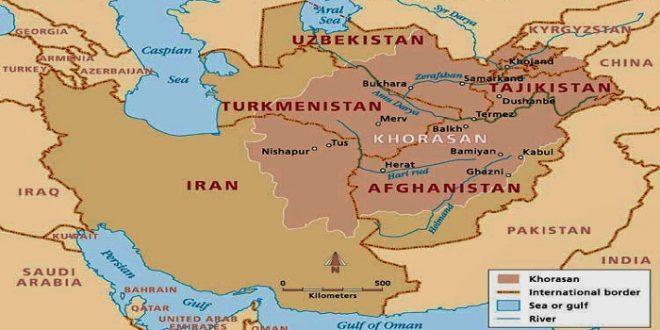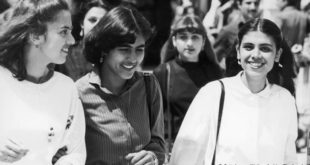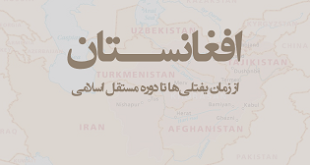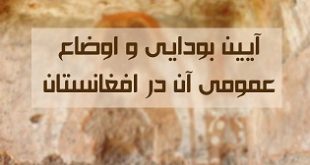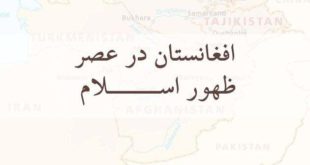The following was written in Farsi (Persian) by Farhang Dost. This is the English translation.
by Sohrab Balkhi
For many years the tribal people have brainwashed us with the idea of national unity and, naively, we have accepted the idea. At the same time, they brutally violated the very fabrics of this imposed national unity that they have advocated. The following is an example of the conniving nature of these tribal people and the lies of national unity that they tried to force upon us.
In one of the counties of the Ghor Province in Central Afghanistan, the people of the county gathered in the middle of the town to discuss the dark times that their region was facing. They were all in a frenzied state, everyone throwing in what they knew. One person in the crowd was saying that Kabul has been looted by the mercenary army forces of Nadir Shah, who was himself the servant of the British. Another town member chimed in that tens of thousands of people had been slaughtered.
Another person added that hundreds of people, including Amir Habibullah Kalakani, have been shot and/or hanged by Nadir Shah and his mercenary pack while someone else said that the forces had no mercy, that they hadn’t even spared the 11-year old son of Kalakani and had torn apart the little boy like a hawk might do to a field mouse. One man said that the entire north of Kabul was looted by the tribes of Mangal, Zazai as well as the tribes of Awghans from the other side of the Durand Line who accompanied Nadir Shah from British India. Someone else said that the British generals were running the massacre show and that Nadir Shah was just a puppet. Then one loud voice overtook them all, saying no one in the history of Khorasan and Aryana has proven to be as dishonorable as Nadir Shah. They never thought that such an ignoble and corrupted person like Nadir Shah, who broke the promise he swore on the Quran, existed in this land. All in all, the discussion was very heated.
Salar, the chief of the county, rose from the crowd and said in a sad and disheartened loud voice, “Brothers, I have just received the news that the tribal and barbaric mercenaries of Nadir Shah are heading towards our province and town and will reach us by late night or early tomorrow morning.” This sent the town people into a further frenzy and Salar had to raise his voice even more in order to be heard. “You must hide whatever goods or valuable belongings you posses. Take as many of your animals — your cows, sheep, horses – and hide them in the mountains. We must hide our women: our mothers, daughters, sisters. We need to keep everything of value away from their sight. They are dishonorable people and will not show mercy on anyone. They will loot everything, kidnap, rape, and even kill.”
In a scared uproar, the people returned back to their houses to hide their goods and valuables. They dug holes deep into the ground to throw their valuable possesses in, told their women to keep covered and hidden in the houses, and took their animals into the rugged mountains to hide. That night, the entire town palpitated with fear and the anticipation of the imminent danger kept them from sleeping. They knew their lives would change for the worse because of the barbaric tribal people who would soon be upon them. The night turned into early morning and the town was awake earlier than usual. A dead silence hung like a pall over the town. No one wanted to venture outside of their house and the people who had stayed in the mountain were too scared to come out of hiding. Everyone was plagued with uncertainty and fear, expecting nothing but the worse. As the sun slowly rose, bringing daylight unto the town and not too far in the distance the mercenary force of Nadir Shah could be seen approaching in a malicious cloud of dust. There were over 1,000 people; some of them had clearly brought their families to aid in the thievery and looting. Within a short time, they had the town surrounded and forced the people out of their houses and had them gather together. The looters took whatever possession they were able to find themselves and knowing that the townspeople had hidden a lot of their goods, they commenced in torturing them for the remainder of the valuables. They tortured and beat them to try to make them talk. Mothers were forced to witness their children beaten to death, daughters were seperated from their families, and fathers were beheaded to serve as examples. Screams of pain and mercy filled the town and went unheeded by the mercenaries. Young children lay crying in pools of blood.
The people had no choice but to confess their hiding places. The unlucky ones were the people who had no belongings to give up. Those who had nothing to give were thought to be lying and they died under the torture inflicted by the barbarians. Aside from the stolen goods, the mercenaries also found and took the pistols, guns, and swords of the townspeople. As they continued to torture the town, they managed to find out about the people hiding in the mountains. A group of the mercenaries headed towards the mountains and dragged the hidden people and their animals out, administering the same torture on them.
After all the looting and killing was done, Mohammed Gul Khan Muhmand, the leader of the band of robbers, took note of the agricultural land and then gathered the townspeople in the center of the town. Amid the whimpers and cries of pain, he stood before them and naming a few of his accomplices, he then said, “We are the new rulers of this land. We are sent by Nadir Shah, the new king. He has awarded us the fertile land of this county.”
He looked around and took pleasure in the frightened state that town was in. “From now on,” he continued, “these lands will belong to my people. They will choose their lands from among yours. And no one can oppose them. It does not matter who it belonged to before, it is all up for grabs now. No one can object to this. The slightest hint of a threat shown by you towards my people will be dealt with swiftly and severely. We will kill you and your entire family. My people are armed and you will never be allowed to carry any kind of arms. We, as the army of the new King Nadir Shah, are the rulers and we will provide security for you as well.”
He then named fifty families and said these families will settle in the town and choose their land. Gul Khan Muhmand called out to one of the uninvited foreigner and introduced him to the town as Mangal Khan Afridi. He said, “From now on, Mangal Khan Afridi is the head of the town.”
Mangal Khan Afridi stood in front of the townspeople, a smug look on his face. He had a thick, long moustache that stretched all the way to both ears. Turning to Gul Khan Muhmand, he asked, “Why do these Khorasanis have such different features? They don’t look all that similar and when they were talking earlier, we heard them talking in different languages. Some of them didn’t even speak in Parsi and those that did, spoke in different dialects of Parsi.” He turned to them in confusion. “But yet, we know they are all Khorasanis.”
Gul Khan Muhmand said, “They are not Khorasanis anymore.” He indicated towards the townspeople with his hand and said, “They are Tajiks Uzbeks, and Hazaras. From now on, they will not be referred to as Khorasanis but by these other names. Never again, will they be Khorasanis. Me and you, we are Awghans and now, we are a part of this region and community. We are the rulers and authority figures and no one must forget that. They are our subjects and we will rule over them.”
After a while, all of the mercenaries left the town, except for the fifty Awghan families chosen by Gul Khan Muhmand. The townspeople temporarily forgot the possession they had lost as they desperately tried to tend to the injured and dead people. They were more worried about the deaths of their people than their materialistic loss. Whimpers of pain and wails of mourning arose as the townspeople surveyed the loss of human loss. Some of the injured people begged to be killed and put out of their misery, their pain was too great, their injuries irreparable. The townspeople’s heart broke collectively, and those who had survived wished they hadn’t. People cried over the senseless tragedy that had befallen the town. One woman came across her son’s body which had been cut to pieces and she fell over him, shrouding him with her shawl as if to protect him from more harm. A young girl who had been physically assaulted was beating herself, knowing the shame that would befall upon her parents. As the townspeople suffered this misfortune, the Awghan families began picking out their newly won lot.
A few months passed and though the two groups resided in the same town, they could not have been further a part from each other. The intruders had chosen most and best of the fertile land while the others struggled to rebuild their lives. The county people referred to the intruders as Naqileens (Aliens, Intruders). These Naqileens never hesitated in performing any oppressive or inhumane act towards the people of the town. While the Naqileens were always armed, the townspeople had no weapons to defend themselves or fight back. They were normal civilians; civilized farmers and merchants and living in this oppressed environment was something new to them. Day by day, the situation grew more tense and unbearable. The townspeople never allowed the Naqileens any mental comfort. They never forgave them or forgot the fact that the Naqileens were brought in by the mercenary army of Nadir Shah, had stolen their livelihood and had access to all the weapons. The county people hated and detested them and made their feelings obvious. There were several occasions where quarrels and scrimmages broke out between the county people and the Naqileens. These fights always ended with the death of a townsperson.
Though the people of the county were of different ethnicities, they had lived together peacefully in that region for thousands of years. They had always been the indigenous people of the land, generation after generation had lived side by side with each other with no trouble. The intruders, Naqileens, now tried to bring about the idea of division to the town, starting with themselves first, claiming that they were Afghans (Awghans) and thus deserved special privileges.
According to Nadir Shah, since he was the one who had seized control of the government, the Awghans were the citizens, rulers and authoritative figure of the country. Because of this new, enforced rule, Awghans who had arrived from the other side of the Durand Line and the south part of Khorasan considered themselves as the owner of the towns and counties. They figured themselves to be the real owners since they had the backing of the government and they considered the indigenous people as the outsiders and as their subjects. Whenever there was an issue between the two different sets of people, they would claim, “We are Awghan and the King is Awghan and it’s our country. Whatever we want and whatever pleases us, we will do.” Being an Awghan came with self-given privileges which they backed with violence and force. The Tajiks, Hazaras, and Uzbeks hated the Intruders, the Naqileens, who had disrupted their entire way of life.
One night, the chief Mangal Afridi held a meeting with the other Intruders. Once they all arrived in his house, he stated the purpose of the meeting. He said, “Dear Awghans, it’s been several years since we’ve lived here but these Khorasanis evidently refuse to be friendly towards us. They don’t want any normal relationship with us and always look at us with hatred and contempt in their eyes. And these feelings of contempt are so strong, we can feel it.”
The rest of the Naqileens nodded in agreement.
“Yes, we have taken their land. But, still, are we not their neighbors?” Mangal Afridi continued. “The events of the past can’t be changed and they should get over it. But yet, they refuse to accept us as their neighbors. Wherever we go, we have to make sure we are armed. We can’t live a normal life like this… always making sure we are protected, always having to be careful and watching our backs. We can’t relax and I know many of us are scared. And many of our kind have disappeared after having killed a townsperson over a quarrel. We don’t know where they are, those five or six of us that have disappeared. Nor do we have any hopes of finding out what happened to them. There is no evidence or any clue and these county people will never cooperate with us or help us in finding out. Even though we are the authority figures and we are the armed ones, we are also the ones who are scared and who live in fear and in a tense situation. We are going crazy! What should we do to have a normal life?”
The rest of the Naqileens started shouting agreements.
Pacha Khan Zazai, one of the Awghans, said loudly, “Everything you say is true. It is a bad situation. Especially after the arrival of Malim (Teacher) Shah Rukh from Kabul. I heard that after Kabul was captured by our forces, Shah Rukh was fired from his teaching position and he moved back to his native home, which was this county. His arrival has drascially increased our problems by several folds. Shah Rukh is teaching the boys of the town how to read and write as well as educating the people of the county. He’s injecting ideas into their heads, and turning the people against us. They are becoming more and more aware of their desolate situation and are not readily accepting their fate.”
Everyone murmured their agreement as Pacha Khan continued. “He’s educating the boys on history and what ‘occupation’ is. He is emphasizing on the differences between us and them in a bad way. The situation has become worse, tenser. They hate us more and more. The other problem is that Shah Rukh is even teaching our own children how to write and read. Our own children don’t listen to us but they seem to hand on every word Shah Rukh says. Whatever that teacher says, they listen. Just the other day, my own son told me that Malim Shah Rukh said that in the Quran, God says that all humans are equal and all humans are brothers. That there are no differences between men.”
Mangal Afridi said, “Yes, Pacha Khan. I have called you all in for this exact reason. I do have an idea, a solution to our problems.”
Pacha Khan said, “Then tell us what this solution is.”
Mangal Khan said, “If we want to live in this town – to live peaceful and normal lives and have regular relationships with the indigenous people then we have no choice but to become friends.
The crowd buzzed with confusion. Pacha Khan asked, “But how can we be friends with them? We took their land which their families have owned for generations. We took it by force and are only able to live there because we have our arms and because we have established ourselves as the rulers. It’s not possible to have their things and be friends at the same time.”
Chief Mangal Khan said, “Well, we can share our privileges with them.”
The discussion continued for a while as they thought of ways to get the townspeople to become friendly towards them. In the morning, the group of Naqileens called out for the representatives of the non-Awghan townspeople and asked for a meeting between the two groups. Once the group had assembled with the Awghans on one side and the non-Awghans on the other, Mangal Khan stood forth and for the first time he referred to the indigenous people as “brothers.” He said, “We have decided to live like brothers. We are equals and can live here together in harmony.”
Salar came forward and said, “Yes, you are right. We are equal. God has created all humans as equal to one another and in Islam, all human beings are brothers. The only differences among us are our actions and the way God will judge us based on those actions and deeds.” Salar gave a pointed look towards Mangal Khan. “So I must say that it is a good sign, indeed, that you have come to realize this, as well. So, tell me. How can we start this brotherly friendship and equality?”
Mangal Khan said, “Well, to begin with, you can become Afghans. And since we are Muslims, too, and Islam does not give privilege to any one group, we are therefore all brothers and are equal. The King is an Afghan, the Kingdom is an Afghan one, and you can become Afghan as well, and we will, of course, share our privileges with you.” Mangal Khan took out the treaty he had written down and commenced reading from it. “Our children and youngsters can marry one another, go to school together. We can do business with one another, etc.”
After the discussion was over, both sides agreed upon the treaty and parted ways. However, after a few days, the people of the town requested another meeting to be held. Both sides met up once more and this time Salar came forth first to speak.
He said, “Now that we are all Afghans and we are equal brothers, it is better that you share your other privileges with us. Just being considered as Afghans is not enough. You must share your other privileges.”
Mangal asked him, “Give us an example. What would you like us to do?”
Salar said, “Shah Rukh has written down some of our demands and requests on a piece of paper and he will read it out loud to you.”
Shah Rukh came forth and started reading from the list. He began, “In the name of God, the most Beneficent, the most Merciful. First, you have taken all the fertile land of the people of this county. You have taken most of the good land and have left practically nothing for us. You can return at least half of them back to the people of the town. Second, you can not continue to use what little agricultural field that the townspeople have left for your animal’s grazing needs. Third, from now on our town will be governed through a counsel. The head of the town will be elected through the counsel which will be made up of both sides. The people will rule themselves. Fourth, you have to get rid of your weapons. Like us, you must live without them. Fifth, you need to send a message to your King and rulers, that they shouldn’t forcefully place our sons in the army. Our sons are there to just act like slaves. They always remain soldiers and they are never promoted to officers of any kind. They should at least have the option of higher ranks. Sixth, the scholars of the town should be allowed to become judges. Whenever there is a quarrel among our people, there is never a fair hearing. We have no voice and your people are always unfair and biased. We need a voice in the courts, too.” Shah Rukh looked up from the paper and looked directly at the Awghans. “There are other demands that we will share with you, but right now, we want you to take care of these issues first. So Afghan brothers, these are our demands and our rights.”
The Awghans made a circle and started talking to one another but they could not come up with a proper answer to the list of conditions read by Shah Rukh. On one hand, they didn’t want to give up their illegitimate privileges, weapons, or their land. And on the other hand, they did not want to give up the shaky peace they had made with the townspeople. They knew it would provide psychological and material security if they had a peaceful relationship with the people. Ultimately, they just wanted to trick the townspeople into accepting a few minor conditions while they still continued to enjoy the more advantageous privileges. The Awghans wanted the best of both worlds by cheating the people of the county so that they can live in security.
On behalf of the Awghans, Mangal Khan said, “We will consider and think over your conditions and discuss them with King Nadir Shah. As you know, some of your conditions are out of our hands, like the one regarding the army and your sons. We need to ask the King.”
Salar said, “We will wait for your response then.”
Mangal left immediately to consult with his King. A week passed and the Khorasanis and the Naqileens impatiently awaited his arrival. One day, several young boys who were playing outside of the county when they noticed movements from far away. It was a shadow of a person approaching their town. They started yelling, “Mangal Khan is back!” and ran into town.
All the people of the county and the Awghans came out of their houses. As Mangal Khan approached the town, he had the stance of a man who had just conquered the world. He could not hide the smug look on his face as he energetically approached the people and proceeded to shake hands with a few of them. He was so excited at the message he had to convey that the tiresome trip he had endured was all but forgotten.
Without anyone having to ask, Mangal Khan went right into the subject. “People of the county, I have the answer to all your questions and your demands. It is just ONE simple answer.”
Everyone started at him in anticipation.
He said, “Your answer is, ‘don’t we Awghans speak Pashto?’”
Confused, the townspeople said, “Yes.”
Mangal Khan gave a quick look towards Pacha Khan, a look full of evil and mockery and Pacha Khan knew his chief had another way to deceive the townspeople.
Mangal Khan then said, “Ze pakhtuwayum (I speak Pashtu). Aw Pakhtanayam (and I’m Pashtun). Besides being Awghan, our language is Pashtu and we are Pashtun. And because we are Pashtun and you are not, we are allowed those extra privileges that you don’t have. But our brotherhood still works because we are still all Awghan.”
With this conniving response, the townspeople looked like Mangal Khan had thrown ice-cold water on their faces. They were so shocked and surprised by this supposedly simple answer. And they were disappointed. They looked at each other and said, “This is another one of their tricks, another way for them to deceive us again. They want to deny us our rights. Until yesterday, they were calling themselves Awghans and now they are Pakhtun AWghans and we are other kinds of Awghans.”
Mangal Khan said, “We are all brothers.”
The Khorasanis looked at him with hatred and one by one, they left him rambling on with his excuse. When he had first arrived, Mangal Khan had a wide smile on his face but as the townspeople left him, his smile slowly died and he tried to tell them not to go and to please listen to him. He ran towards Salar and asked him to say something to the people to make them stay.
Salar looked towards Shah Rukh and made a gesture. Mangal noticed this gesture and he also turned to the Malim.
Shah Rukh said, “I know exactly what the people of the town are thinking. I know what they want. And until you stop deceiving the people, and stop oppressing them with these illegitimate claims, there will never be any brotherhood between us nor will there be peace. With all your cheating and deceiving you think you can have security? Evil and trickery does not bring about equality or brotherhood. I just want to tell you something so that you can think over it. You made your way here with mercenary forces. In order to have security, we need to establish justice here. If you believe in Islam and our great Prophet Mohammad then you will discontinue your evil acts. It is possible to have security and progress in a country without Islam. But you can not have peace or security in a country without justice. I want to make something clear to you and your Awghans. We will not become Afghans. We are Tajik, we are Uzbek, we are Hazara. And we are Khorasanis. Our fathers lived here for centuries like brothers and we will continue that. They lived under these ethnicity identities as well as the identity of Khorasani. And if you want to be our brothers and live with us here and shake our hands in brotherhood then you must stop these tricks. Then we can make a United Nation of Great Khorasan. And you can become Khorasanis and give up the illegitimate privileges. No more deception. Only equality, brotherhood, and justice.”
May God grant victory for people seeking justice.
 سیاحآنلاین خبر، تحلیل و دیدگاه
سیاحآنلاین خبر، تحلیل و دیدگاه
